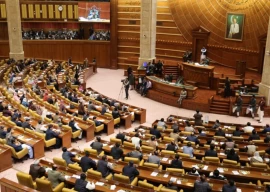
A senior military official said on Thursday that his first reaction following reports that Osama bin Laden had been killed was an ‘uncomfortable’ feeling. “In fact, I got a bad feeling and my first thought was how do we handle this?” he said.
The military and intelligence officials outlined the sequence of events and said the ingress of US helicopters into Pakistani airspace was not detected, because they (the US) know the location of our radars and have terrain maps. They can make permutations to avoid our radars by flying low and using the mountains. They used a passive technique,” an official said. “If they had jammed our radars, we would have noticed.”
The military sought to dispel domestic doubts and concerns after the American assault on Osama’s hideouts over the weekend, saying the military had no prior information at any stage about the impending assault.
The Pakistan Air Force scrambled its jets upon receiving information that a foreign helicopter had been downed in the area, but by the time the jets reached, the helicopters were already on their way back, military officials said.
At a briefing given to television anchors in Rawalpindi on Thursday, officials said the Pakistan Military Academy, Kakul, was virtually empty at the time of the assault as cadets and instructors were on leave. The only personnel present were the Quick Reaction Force, which guards the academy’s gates. They saw the American helicopter go down and reported it, prompting the PAF reaction.
Military officials said that they had been taken by surprise. Maintaining that progressive intelligence sharing is a two-way process, they said no intelligence agency shares 100 per cent of its information because it can compromise its own ‘assets’. The ISI agency shares information with the CIA as intelligence is gathered.
Officials said that in April this year, they had told the CIA that suspicious phone calls had been intercepted, which could be traced to the compound in Abbottabad. However, they claimed, at no point did they realise that Bin Laden was present there. “If we had known, we would have gone after him ourselves,” said an intelligence official.
One military official also said while the trust deficit between the CIA and ISI may have contributed to Pakistan being kept out of the loop, he believed the CIA wanted to take all of the credit and not share it with the ISI, indicating that a simple turf war may have been at the root of the lack of cooperation in this incident.
“We shared intelligence that helped lead to Bin Laden in August 2010. If, as accused, we had hidden Bin Laden, why would we give information leading to his hideout?” an intelligence officer said.
However, the officials admitted to inadequacies and said an inquiry has been ordered within the ISI. Clearly, the ISI and the military high command are well aware they dropped the ball when it came to following up and linking the dots when it came to chasing after Osama bin Laden.
Intelligence officials reiterated that the ISI will act in Pakistan’s interest and had conveyed to the CIA chief that the presence of their people in the country is not in the national interest. However, they said, the agencies will work together in the foreseeable future as interests converge to some extent.
They said that on the ground, Pakistan’s intelligence agency officials are badly outnumbered by foreign intelligence officials. An official pointed out that President Zardari and Prime Minister Gilani had authorised the Pakistani embassy in Washington to issue visas. “Over 7,000 visas were issued without the ISI’s clearance. Many of them were issued to personnel of the Regional Affairs Office (RAO), which is responsible for disbursement of Kerry-Lugar funds,” he said, implying that the RAO could be a cover for American intelligence officials.
They said that there is a huge difference between the technical capacity of the ISI and the CIA. “They [the CIA] can process information much faster,” an official said. “[But] some agency had to get to Bin Laden at some point. The CIA got him. It could have been the ISI or the MI6 or anyone. You can’t say all of them failed,” an official said.
Responding to questions about Pakistan’s sovereignty breach, a military official said that a national response needs to come from the government, its cabinet and its parliament.
Published in The Express Tribune, May 6th, 2011.


1672385156-0/Andrew-Tate-(1)1672385156-0-165x106.webp)




1732012115-0/Untitled-design-(14)1732012115-0-270x192.webp)









COMMENTS (20)
Comments are moderated and generally will be posted if they are on-topic and not abusive.
For more information, please see our Comments FAQ